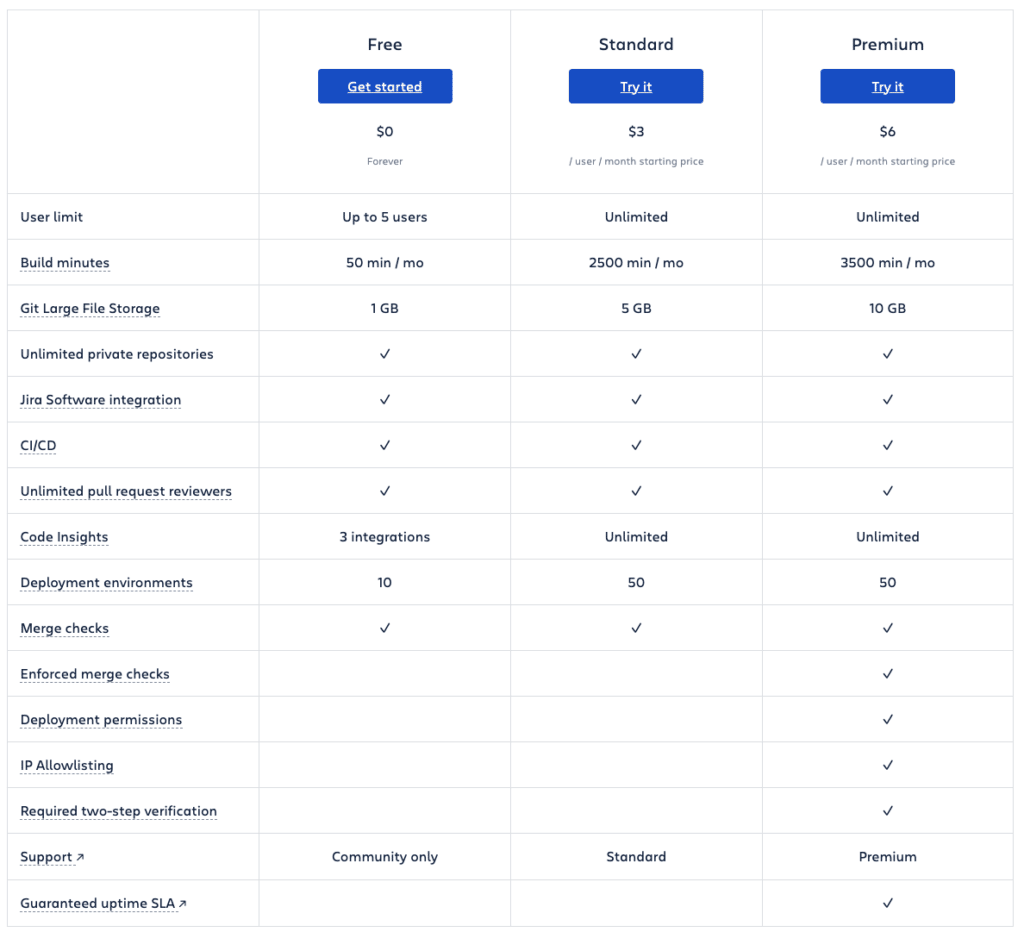Bitbucket or GitHub? These hosting platforms are popular because they offer software development teams the ability to create, manage, track, and review code repositories. They are essential tools for developers in various industries and can be used for numerous applications and projects. So, if your team is growing out of local repositories, then it may be time to level up to a more robust coding repository platform.
GitHub and Bitbucket are made for scalable implementations, small teams, and professional operations alike. Choosing one over the other is tough since they both come with many amazing features. But while there are many similarities, there are a few key differences to consider.
Let’s break down the similarities and differences between GitHub and Bitbucket so you can choose the best option for your team.
GitHub in a Nutshell
If you’re a developer, then you’ve definitely heard of GitHub. It’s one of the most-used development platforms in the world. GitHub has a loyal following within the coding community, hosting millions of repositories, and is deemed a Git version control hub by its users. The platform is the largest host of source code, primarily focusing on public code. You can use the open-source repository to review and host code, build software, and even manage projects.
It’s written in Erlang and Ruby and supports more than 200 programming languages, perfect for developers working across various environments. It also comes with desktop clients for either Windows or Mac and direct integrations. Some app integrations include Azure, Amazon, Zendesk, Google Cloud, Code Climate, and Heroku.
Here’s an overview of just a few of their coding tools for developers:
- Actions- allow users to automate any workflow
- Packages- enable leaders to host and manage packages
- Security- allow users to find features and fix vulnerabilities
- Codespaces- help users create instant dev environments
- Copilot- allows teams to write better code with AI
- Code review- helps manage code changes
- Issues- enable teams to plan and track work
- Discussions- spaces to collaborate outside of code
Some other GitHub features include support for Git and SVN. And you get unlimited public repositories for free.
Bitbucket Basics
Bitbucket helps teams manage version control and is another great repository hosting platform. It has similar features and benefits as GitHub, with a few differentiating tweaks here and there. This Git solution is written in Python and built on Django, a great combination for rapid coding projects. While not quite as popular as GitHub, Bitbucket also has a loyal following of fans that swear by its ability to adapt to different business environments.
With Bitbucket, you can easily import repositories from places like Codeplex, Git, GoogleCode, and SVN. Bitbucket offers direct integrations with Jira, Crucible, Jenkins, and Bamboo. It also offers authentication for external platforms like GitHub, Google, Twitter, and Facebook and has Mac, Windows, and Android clients that integrate heavily with Trello.
Here are some of the other features you can count on with Bitbucket:
- Pipelines- let users automate their code from test to production
- Security- backed by Atlassian Cloud keeps users’ data safe
- Code Review- enables teams to find bugs faster and merge easily
- Cloud- offers DevSecOps integrations and management
What Bitbucket may lack in features, it makes up for in rich integrations. No matter what your coding and development needs are, Bitbucket probably has a solution or integration for you.
Similarities Between Bitbucket and GitHub
Bitbucket and GitHub are both excellent developer tools and two of the most popular choices when it comes to source code repositories. Now that we’ve gone over each hosting platform individually, you may start to see how similar they are. They both offer public and private repository options, and they operate in very similar ways.
Here are some of the general similarities between GitHub and Bitbucket:
- Developers can create, manage, and review code repositories.
- Easily make pull requests.
- Conduct code reviews with confidence.
- Requires two-factor authentication for all users.
- Comes with inline editing as well as Markdown support.
- Track performance issues across your team.
You might already be thinking that these two repository platforms sound a lot alike, and you would be correct. There is a reason these two platforms are among the most popular hosting services available for developers.
Differences Between GitHub and Bitbucket
While GitHub and Bitbucket are both wonderful tools for developers, they each have unique features that make them optimal for different coding environments.
Let’s take a closer look at the main differences between Bitbucket and GitHub.
User Interface
One of the most obvious differences between these two platforms is the UI. Bitbucket recently reworked its interface so that it’s easier to find your way with a convenient sidebar and a simple dashboard that presents your work in progress clearly.

Bitbucket interface
GitHub also has an easy-to-use interface, but it is a little less streamlined than Bitbucket’s new look. Although the interface isn’t as sleek, it still offers developers utilities and navigation shortcuts to make coding easier.

GitHub interface
Plus, there’s a rumor that GitHub is developing a voice interface to work with their Copilot AI assistant.
Tools, Extensions, and Automation Options
Both GitHub and Bitbucket offer a variety of apps, extensions, and tools that increase their functionality for developers. One of those tools includes the amazing GitKraken Client. Regardless of which tool you choose, GitKraken Client’s integration with both services makes it easy for developers to manage their repositories quickly and securely.
Bitbucket offers over 2,000 apps through the Atlassian Marketplace and has cross-product compatibility with Atlassian products.
GitHub marketplace offers many apps and extensions to add value to their platform, but not nearly as many as Bitbucket. Although there are only about 100 apps to choose from, you also get the benefit of applying GitHub Actions to increase your productivity.
More than 30% of organizations use automation to improve internal processing speed and accuracy, and it’s quickly becoming a necessity for businesses of all types. Bitbucket Pipelines offer workflow automation, but GitHub has a leg up on Bitbucket when it comes to automated tools and resources.
Access Provisioning
You can grant users access to chosen branches using either Bitbucket or GitHub. That way, you can configure permissions to restrict collaborators and other users from having full access to everything in your repository. This is a feature that no developer can go without in our current era of high-level cyberattacks and sophisticated threat actors.
However, only one of these platforms offers this handy feature without a charge: Bitbucket. You can also benefit from granting specific access permissions for free on public repositories with GitHub. However, if you want to enforce certain access rules on private repositories, you will need a paid plan.
GitHub vs Bitbucket Pricing
Both GitHub and Bitbucket allow users to host an unlimited number of public repos on their platform. For the individual developer this likely means that pricing plans won’t have a material impact on which service they choose to leverage. However, for larger development teams that need to store private repositories, manage seats, or monitor permissions more closely, it’s worth examining the pricing structures more closely.

Bitbucket offers “Free,” “Standard,” and “Premium” versions to be paid monthly. The build minutes, file storage, and deployment environments increase with each tier. Additionally, there is a five user limit for Free, but no user limit for the Standard or Premium tiers. The Premium tier also offers features not available for either other teaser, including Enforced Merge Checks, Deployment Permissions, and IP Allowlisting.

GitHub offers “Free,” “Team,” and “Enterprise” tiers to be paid annually. New features are offered with each subsequent tier level. The Enterprise tier offers annual SCO1, SCO2, and type 2 reports and the ability to centrally manage multiple organizations at once. The Team Tier is best for single organizations. Additionally, discounted pricing is offered for annual customers who pay via credit card or PayPal.
The Biggest Difference Between Bitbucket and GitHub
Before you sign up for a code repository hosting platform, it’s crucial that you take into account if your teams mainly code publicly or privately. The biggest difference between GitHub and Bitbucket is that one is geared toward private repositories while the other is meant more for public repositories.
Which one is which? Bitbucket is generally used by enterprise developers, while GitHub widely used by open-source developers. That doesn’t mean they are exclusive to these use cases, but each platform lends itself to different coding specialties.
You can use open-source code to write proprietary software with Bitbucket, but there are risks involved. And you can use GitHub for private coding, but it is made to work seamlessly with a community of developers that share code and ideas.
Developers can still use Bitbucket to host open-source repositories and collaborate with their developer community, but if your goal is to reach a wide audience of developers, then GitHub might be right for you.
In short, if you’re developing for a business or enterprise organization or if your teams rely on private repositories, you may want to consider giving Bitbucket a try. If you’re developing for personal or small team projects, consider using GitHub.
Bitbucket vs. GitHub: Which is Better?
GitHub and Bitbucket are both formidable products that offer numerous integrations, simple developer tools, and online support communities. They are very similar in form and function, with a few minor differences that set them apart.
Choosing the best hosting platform for your coding repositories can be tricky. There is a lot of overlap between developer needs and the features of these two platforms. However, Bitbucket and GitHub each have unique advantages that differentiate them for certain development teams.
In summary, GitHub is a popular open-source repository platform perfect for projects that can be shared with the public, while Bitbucket is a great solution for teams looking for a secure place for their proprietary code.
Whether you choose GitHub or Bitbucket, GitKraken Client’s integration with these tools make it easier and more visual to manage your repositories.
 GitKraken MCP
GitKraken MCP GitKraken Insights
GitKraken Insights Dev Team Automations
Dev Team Automations AI & Security Controls
AI & Security Controls







